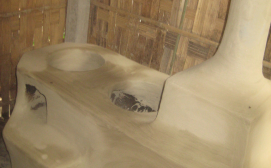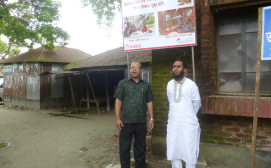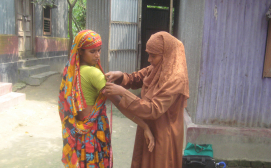Project Lead(s): Anisuddin Ahmed
Issue
Low-birth-weight (LBW) is a major, adverse pregnancy outcome in resource-poor countries and is associated with high mortality and morbidity in infants.
Studies have shown that there is a clear association between low birth weight and exposure to biomass fuel during cooking.
In developing countries, many households rely on biomass fuels for cooking, usually with inefficient and unvented household stoves that, combined with poor ventilation, generate large volumes of polluted smoke indoors.
Solution
The project team has developed a locally-made, extremely simple and inexpensive kitchen (‘the $100 kitchen’) that includes an environmentally friendly clean-combustion cooking stove.
This prefabricated mobile kitchen has reinforced cement infrastructure with a fence made from a local material, such as bamboo. This allows enough ventilation to reduce the exposure of biomass fuels to the pregnant mothers.
The kitchen is installed outside the living room so that there is very little chance of polluting indoor air in the household.
The key component of the kitchen is an improved cookstove where the biomass fuel is combusted in controlled conditions to replicate a gaseous fire with minimal emissions. The polluted smoke is then discharged through a chimney positioned on the stove.
From 2012 to 2014, a cluster-randomized controlled “$100Kitchen with improved cookstove” intervention trial was conducted among 1267 pregnant women at 8–12 weeks gestational age in Shahjadpur sub-district of Bangladesh.
Outcome
The study showed promising results that prenatal use of the “$100Kitchen with improved cookstove” resulted in significant reduction in the incidence of LBW among the rural newborns.
They also observed a substantial reduction in carboxyhemoglobin levels in the blood between the intervention group versus controls.
A similar, cluster-randomized controlled trial in a larger population in Matlab (a rural sub-district in Chandpur district of Bangladesh) is being proposed to confirm the association between the reduction of biomass fuel exposure and the incidence of preterm newborn and/or as well as to explore the potential biological pathways.
The results generated from this proposed scale-up study will help to advance the knowledge on physiochemical changes in pregnant women and their fetuses in response to household air quality due to biomass fuel exposure. At completion of the project, a manuscript was under preparation






